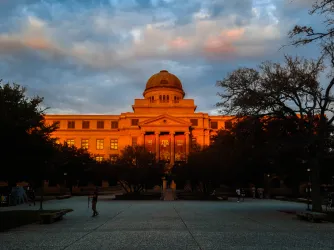Table of Contents
Ninth Circuit: Professor's Speech Protected Under First Amendment

In a victory for free speech on campus, the United States Court of Appeals for the Ninth Circuit issued a ruling yesterday addressing a question raised but not answered by the Supreme Court of the United States in Garcetti v. Ceballos (2006): whether the First Amendment protects public college faculty members’ speech “related to scholarship or teaching,” despite the Court’s holding in Garcetti that public employees may be disciplined for “speech made pursuant to the employee’s official duties.” Writing for a unanimous Ninth Circuit panel in yesterday’s opinion (PDF), Judge William Fletcher stated unequivocally that “Garcetti does not—indeed, consistent with the First Amendment, cannot—apply to teaching and academic writing that are performed ‘pursuant to the official duties’ of a teacher and professor.”
This ruling, Demers v. Austin, is an important victory for public university professors in the nine states that the Ninth Circuit comprises and affirms First Amendment principles in an area of law left unsettled after Garcetti.
The First Amendment, of course, normally protects citizens from punishment or retaliation by the government in response to speech. But the Court has long recognized that when acting as an employer, the government may exercise degrees of control over employee speech not otherwise permissible. The seminal case for determining whether public employee speech enjoys First Amendment protection is Pickering v. Board of Education (1968), in which the Supreme Court considered two factors: whether the employee’s statements “regarded matters of public concern,” and whether the employee’s “interest as a citizen in making public comment” outweighed “the State’s interest in promoting the efficiency of its employees’ public services.”
In Garcetti, however, the Supreme Court altered the standard forged by Pickering and its progeny, ruling that there must be an exception for speech that is “a part of what [the employee] was employed to do.” The Court explained:
Government employers, like private employers, need a significant degree of control over their employees' words and actions; without it, there would be little chance for the efficient provision of public services.
[...]
Employees who make public statements outside the course of performing their official duties retain some possibility of First Amendment protection because that is the kind of activity engaged in by citizens who do not work for the government. The same goes for writing a letter to a local newspaper, see Pickering, supra, or discussing politics with a co-worker, see Rankin, 483 U. S. 378. When a public employee speaks pursuant to employment responsibilities, however, there is no relevant analogue to speech by citizens who are not government employees.
[...]
Proper application of our precedents thus leads to the conclusion that the First Amendment does not prohibit managerial discipline based on an employee's expressions made pursuant to official responsibilities. [Emphasis added.]
Recognizing, however, that citizens should not be forced to surrender fundamental rights in order to work in the public service, the Garcetti Court held that when public employees speak “as a citizen addressing a matter of public concern,” or perform “the kind of activity engaged in by citizens who do not work for the government,” their speech may be protected.
As applied to faculty at public colleges and universities, the distinction between ideas expressed as a teacher and ideas expressed as a citizen makes less sense. The heart of a professor’s job is to present students the world of ideas—even those ideas with which the government may disagree. As the American Association of University Professors’ famous 1915 Declaration of Principles on Academic Freedom and Academic Tenure put it, the university “should be an intellectual experiment station, where new ideas may germinate and where their fruit, though still distasteful to the community as a whole, may be allowed to ripen until finally, perchance, it may become a part of the accepted intellectual food of the nation or of the world.”
So while allowing discipline for speech “pursuant to ... official duties” might allow governmental entities to function efficiently, it also permits a degree of governmental control of public faculty speech that runs counter to the very purpose of a university.
Justice Kennedy, writing for the majority in Garcetti, recognized that the Court’s holding might be problematic as applied to educational institutions, and explicitly exempted such application:
There is some argument that expression related to academic scholarship or classroom instruction implicates additional constitutional interests that are not fully accounted for by this Court's customary employee-speech jurisprudence. We need not, and for that reason do not, decide whether the analysis we conduct today would apply in the same manner to a case involving speech related to scholarship or teaching.
Despite Justice Kennedy’s exemption, however, Garcetti has proven very problematic in the academic setting. We’ve written often about its deleterious effect on academic freedom here on The Torch, and the AAUP has worked diligently since Garcetti’s issuance to stem its negative impact. Indeed, the struggle to preserve academic freedom in Garcetti’s wake makes the Ninth Circuit’s crucially important ruling yesterday particularly welcome.
In Demers, Washington State University (WSU) faculty member David Demers claimed that the school retaliated against him for distributing a pamphlet he had written describing a plan for improving WSU’s communications programs, as well as excerpts from a draft of a book he was writing. Demers sent the pamphlet to administrators and faculty at WSU and included a description of his book in a self-prepared “Faculty Annual Report.” With respect to the book excerpts, both the district court and the Ninth Circuit held that there wasn’t enough information on the record to sustain a retaliation claim. With respect to the pamphlet, though, the district court held that because it was distributed pursuant to Demers’ duties as a faculty member, it was unprotected under Garcetti. Further, the district court found that the pamphlet did not address a matter of public concern. It granted summary judgment to WSU.
The Ninth Circuit flatly disagreed with the district court’s application of Garcetti, holding that “Garcetti does not apply to teaching and writing on academic matters by teachers employed by the state” and making clear that “Garcetti does not—indeed, consistent with the First Amendment, cannot—apply to teaching and academic writing that are performed ‘pursuant to the official duties’ of a teacher and professor.”
Rather than assessing Demers’ speech under the Garcetti framework, the Ninth Circuit concluded that his expression should be analyzed under the standard set by the Supreme Court in Pickering. As discussed above, the Pickering test allows for a careful assessment of competing interests in cases involving faculty members—a necessary advantage, given that “teachers necessarily speak and write ‘pursuant to ... official duties,’” as the Ninth Circuit observed. Under Pickering, the faculty member “must show that his or her speech addressed matters of public concern,” and that his or her interest in commenting upon these matters “outweigh[s] the interest of the State, as an employer, in promoting the efficiency of the public services it performs through its employees.”
Emphasizing that “protected academic writing is not confined to scholarship,” the Ninth Circuit found that Demers’ pamphlet “made broad proposals to change the direction and focus of the School” and addressed issues that administrators had already been discussing among themselves. Accordingly, the Ninth Circuit held that Demers’ proposals were a matter of public concern.
Demers himself has not yet won on the merits. The Ninth Circuit remanded the case to the district court to balance Demers’ established First Amendment right with WSU’s interest in controlling Demers’ speech and to determine whether the pamphlet was the impetus for adverse action against Demers. Further, because the law surrounding Garcetti is in flux, the Ninth Circuit upheld the defendants’ qualified immunity defense, which means that Demers cannot obtain punitive damages. But Demers himself is focused on what the case means for the future of academic freedom, saying: “This was a case about principles and free-speech rights, not money.” With the case already having cost Demers $350,000, he is certainly taking one for the team.
Happily, Demers v. Austin is not the first instance in which a federal appellate court has correctly recognized Garcetti’s academic exception. As FIRE’s Will Creeley reported in March, the United States Court of Appeals for the Fourth Circuit recently affirmed the importance of academic freedom and reversed a district court’s dismissal of a professor’s claims that he was retaliated against for expressing political viewpoints. In remanding the case back to the district court for further proceedings, the United States Court of Appeals for the Fourth Circuit noted in Adams v. Trustees of the University of North Carolina–Wilmington (4th Cir. 2011) (PDF):
We are ... persuaded that Garcetti would not apply in the academic context of a public university as represented by the facts of this case.
[...]
Applying Garcetti to the academic work of a public university faculty member ... could place beyond the reach of First Amendment protection many forms of public speech or service a professor engaged in during his employment. That would not appear to be what Garcetti intended, nor is it consistent with our long-standing recognition that no individual loses his ability to speak as a private citizen by virtue of public employment.
Absent a U.S. Supreme Court ruling on this issue, it is imperative that circuit courts rule to protect faculty speech as the Fourth and Ninth Circuits have done. As Popehat’s Ken White writes:
This is hugely important: had the[] Ninth Circuit ruled the other way, then the state could fire professors at will if it didn’t like, for instance, the stance that a history professor took about a historical event, or a political science professor took about a political dispute, or any professor took about an issue of academic governance on a committee.
FIRE commends Demers for fighting this fight, and we are very pleased that the Ninth Circuit Court of Appeals has set this critically important precedent. Read the Ninth Circuit’s full opinion here.
Recent Articles
Get the latest free speech news and analysis from FIRE.

The American people fact-checked their government

Facing mass protests, Iran relies on familiar tools of state violence and internet blackouts

Unsealed records reveal officials targeted Khalil, Ozturk, Mahdawi solely for protected speech
